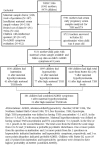The impact of gestational thyroid hormone concentrations on ADHD symptoms of the child
- PMID: 24384024
- PMCID: PMC3879664
- DOI: 10.1210/jc.2013-2943
The impact of gestational thyroid hormone concentrations on ADHD symptoms of the child
Abstract
Context: Maternal hypothyroidism during pregnancy is associated with adverse neuropsychological development in the offspring.
Objective: The objective of the study was to evaluate the effect of maternal thyroid dysfunction during pregnancy on a child's attention-deficit/hyperactivity disorder (ADHD) symptoms.
Design, settings, and participants: The prospective, population-based Northern Finland Birth Cohort 1986 (9362 pregnancies; 9479 infants) included analysis of maternal TSH, free T4, and thyroid-peroxidase antibodies (TPO-Abs) from early pregnancy samples (5791 women). Teachers evaluated the children's ADHD symptoms at 8 years using the Rutter B2 scale (5131 mother-child pairs), in which a high score indicated probable psychiatric disorders and three questions focused directly on ADHD.
Main outcome measures: The odds ratios (ORs) and 95% confidence intervals (95% CIs) of child having ADHD symptoms and/or a high Rutter B2 score after exposure to increases in maternal TSH levels (after logarithmic transformation), low free T4 levels, and TPO-Ab positivity was tested with logistic regression, adjusting for maternal/family covariates. Data were stratified by the child's gender due to interaction.
Results: Among girls the odds of inattention (OR 1.18, 95% CI 1.02-1.37), high Rutter B2 total score (OR 1.23, 95% CI 1.03-1.48), and combined ADHD symptoms (OR 1.39, 95% CI 1.07-1.80) significantly increased with every natural log increase in maternal TSH concentrations. Such findings were not evident in boys. No associations were seen between ADHD symptoms and low maternal free T4 levels or TPO-Ab positivity.
Conclusions: Increases in maternal TSH in early pregnancy showed weak but significant association with girls' ADHD symptoms.
Figures
References
-
- de Escobar GM, Obregon MJ, del Rey FE. Maternal thyroid hormones early in pregnancy and fetal brain development. Best Pract Res Clin Endocrinol Metab. 2004;18:225–248 - PubMed
-
- Cao XY, Jiang XM, Dou ZH, et al. Timing of vulnerability of the brain to iodine deficiency in endemic cretinism. N Engl J Med. 1994;331(26):1739–1744 - PubMed
-
- Auso E, Lavado-Autric R, Cuevas E, Del Rey FE, Morreale De Escobar G, Berbel P. A moderate and transient deficiency of maternal thyroid function at the beginning of fetal neocorticogenesis alters neuronal migration. Endocrinology. 2004;145(9):4037–4047 - PubMed
-
- Gardner L. Historical notes on cretinism. In: Gardner LI, ed. Endocrine and Genetic Diseases of Childhood and Adolescence. 2nd ed Philadelphia: W. B. Saunders; 1975
Publication types
MeSH terms
Substances
Grants and funding
LinkOut - more resources
Full Text Sources
Other Literature Sources
Medical


